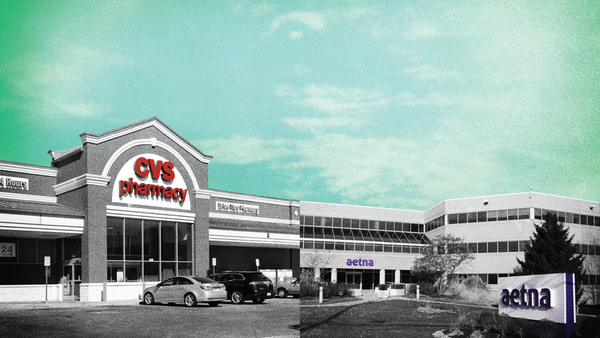 CVS has dodged one hurdle in its bid to buy insurer Aetna Inc., as antitrust enforcers don't see competitive problems that can stem from uniting companies that operate at different levels of a supply chain.
CVS has dodged one hurdle in its bid to buy insurer Aetna Inc., as antitrust enforcers don't see competitive problems that can stem from uniting companies that operate at different levels of a supply chain.
CVS Health Corp. said it is working “productively” with U.S. regulators to get its $68 billion acquisition of health insurer Aetna Inc. approved, and the process is moving along as expected.
The deal may be approved in the third quarter or early in the fourth quarter, CVS said in its earnings statement on Wednesday. That's a narrower timeframe than the company had previously provided. The shares jumped as much as 6 percent to $69.39.
Related: Anthem, Cigna pay $3M to states that sued to block merger
CVS has dodged one hurdle in its bid to buy insurer Aetna Inc., as antitrust enforcers don't see competitive problems that can stem from uniting companies that operate at different levels of a supply chain, Bloomberg News reported Tuesday. That question has hung over the deal since it was announced last year because the Justice Department under President Donald Trump has raised the bar for approving such transactions, which are known as vertical deals because they don't combine direct competitors.
CVS, best known for its namesake chain of pharmacies in the U.S., is also one of the country's largest providers of pharmacy benefits for employers and health plans — and both of its businesses face industrywide challenges. CVS's proposed plan to buy Aetna would help it offer a larger combination of medical services under one roof. PBM rival Express Scripts Holding Co. is also in the midst of a megadeal after agreeing to be bought by Cigna Corp. Both transactions are being reviewed by antitrust regulators.
PBMs have been singled out by Trump administration officials this year for contributing to the soaring cost of medications in the U.S. In July, the Health and Human Services Department submitted a proposal to the White House that would curb kickback exemptions that allow drugmakers to offer insurers and pharmacy-benefit managers rebates that are sometimes blamed for keeping drug prices high.
Rebutting criticism that PBMs like CVS help spur higher drug prices through a rebate system that they profit from, the company provided some details about its arrangements with its employer and health-insurer clients.
During its earnings presentation on Wednesday, CVS said about 98 percent of the rebates are returned to clients. This year CVS expects that retained rebates will be about $300 million, or 3 percent of its annual earnings per share.
“The idea that rebate retention is correlated with higher drug prices is entirely false,” Chief Executive Officer Larry Merlo said on a conference call. In its own data, CVS finds that drug price prices have grown the fastest for medicines that have little competition and offer few rebates, as opposed to highly rebated categories, the CEO said.
Net loss
In the second quarter, CVS reported a $2.56 billion net loss because of a $3.9 billion non-cash impairment charge related to its long-term care business. That business, acquired as part of CVS's purchase of Omnicare Inc. in 2015, has been hit by lower client retention rates and lower occupancy rates in skilled nursing facilities, CVS said in a statement.
The company benefited from lower taxes in the quarter, stemming from the goodwill impairment charge, which is not deductible for income tax purposes, and from the cut in corporate taxes signed into law the U.S. Excluding the charge and some other items, earnings were $1.69 a share, beating the $1.60 average of 19 analysts' predictions compiled by Bloomberg. Same-store sales, a key metric that focuses on established locations, rose 5.9 percent on strong prescription growth.
Another threat come from Internet giant Amazon.com Inc., which made an entry into the pharmacy business with the acquisition of online pharmacy PillPack, announced in June. The deal, worth about $1 billion according to people familiar, could eventually bring Amazon into direct competition with chain pharmacies like CVS.
CVS's proposed takeover of Aetna would bring together around 10,000 CVS stores and the health insurer's 22 million customers. A central concept behind the deal is transforming the stores into health hubs where consumers can get care, pick up their drugs, buy some cosmetics, and stay out of the hospital.
— With assistance by Vivian Li, and Karen Lin
© 2025 ALM Global, LLC, All Rights Reserved. Request academic re-use from www.copyright.com. All other uses, submit a request to [email protected]. For more information visit Asset & Logo Licensing.







